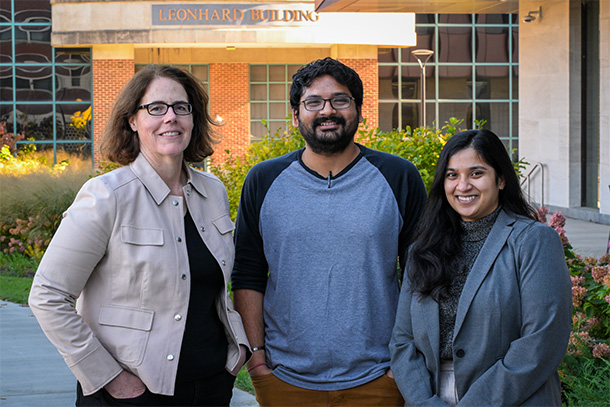
Christine Kirchhoff (left), associate professor of civil and environmental engineering and associate professor of law, policy and engineering, poses with two of the members of the Civic SciTech Traineeship, a new initiative of COPA-STEP that matches trainees with governmental offices to develop civic science tools. Vijay Bhaskar Chiluveru (center), a recent graduate of the master’s program in energy and mineral engineering in Penn State's College of Earth and Mineral Sciences, and Soumita Mukherjee (right), a doctoral candidate in informatics in the College of Information Sciences and Technology, will work on developing civic science tools for air quality monitoring and heat island mapping in Allentown. Credit: Poornima Tomy/Penn State.
New initiative in Law, Policy and Engineering trains state governor’s fellows
The initiative, COPA-STEP, provides science and technology policy training for state fellows with plans for future science discourse and policy events
Oct 30, 2024
By Mariah Lucas
UNIVERSITY PARK, Pa. — Faculty and staff in Penn State’s Law, Policy, and Engineering initiative (LPE) were recently tapped by the governor’s office to lead a two-day training program in September in Harrisburg on science and technology policy. The participants included 23 fellows from the Governor’s Science and Technology Fellowship, the William and Hannah Penn Fellowship and Govern for America.
The faculty and staff are part of Commonwealth of Pennsylvania Science and Technology Policy Program (COPA-STEP), which is run by LPE and “aims to improve public and environmental health, economic and social equity, and public scientific discourse in the Commonwealth of Pennsylvania,” according to its website.
The governor’s fellows received hands-on training from COPA-STEP on skills related to science and technology policy, such as science communication and policy memo writing. COPA-STEP plans to lead an additional training later this fall with fellows from both Pennsylvania and New Jersey and will continue to offer trainings for fellowship programs in the coming years.
COPA-STEP began as a volunteer-run program focused on creating a legislative fellowship before transitioning into LPE in October 2023. Led by Christine Kirchhoff, associate professor of civil and environmental engineering and associate professor of law, policy and engineering in the School of Engineering Design and Innovation(SEDI), COPA-STEP now facilitates local government fellowships, external engagements and formal trainings related to science and technology policy. COPA-STEP also fundraises to place postgraduate science and technology fellows in the state legislature and entities that support policy development.
Together with David Mazyck, head of SEDI, Kirchhoff was awarded a $100,000 seed grant from the National Conference of State Legislatures in October 2023. The seed grant contributed to LPE hiring a part-time project associate, Patricia Gruver-Barr, to lead COPA-STEP initiatives.
“I had a background in science, technology and public policy from my previous positions at the University of Michigan and University of Colorado and saw the value in bringing something like COPA-STEP to Penn State under LPE’s umbrella,” Kirchhoff said. “What started as a passion project by volunteers dedicated to bringing a state legislative fellowship program to Pennsylvania has now expanded to initiatives that can benefit engineering students as well as students and others around the University and commonwealth.”
One of those initiatives, the Civic SciTech Traineeship, launched in October. The three members of the pilot program — Soumita Mukherjee, a doctoral candidate in informatics in the College of Information Sciences and Technology; Kaylee Neat, a master’s student in geosciences in the College of Earth and Mineral Sciences (EMS); and Vijay Bhaskar Chiluveru, a recent graduate of the master’s program in energy and mineral engineering in EMS — will work on developing civic science tools for air quality monitoring and heat island mapping in Allentown.
The students will work remotely with the opportunity to present their policy recommendations to the mayor of Allentown at the end of six months and will be paid approximately $1,500 with funding available in LPE.
“Students are looking for ways to bolster soft skills and competencies to get more experience in science policy, and, currently, there are not a ton of ways for them to do that within their degree programs,” Kirchhoff said. “The Civic SciTech Traineeship can fill a void for students across all colleges seeking more experience in government and policymaking.”
Additionally, in November, COPA-STEP will host a science policy symposium, where participants will meet and pitch science policy ideas to policymakers and policy practitioners in state government.
“While LPE is the research and education arm, COPA-STEP is the applied practice arm of our work within law, policy and engineering,” Kirchhoff said. “COPA-STEP will continue to focus on training, outreach and professional development to build the science policy ecosystem at Penn State and beyond.”
In fall 2025, LPE will launch its graduate certificate program, to include a suite of three, three-credit graduate courses. Engineering Law and Policy Systems will be taught by Kirchhoff; Engineering, Law, and Technology Policy Practicum will be taught by Andrea Matwyshyn, professor of law and engineering policy and associate dean for innovation and technology, Penn State Law; and Engineers and Scientists Shaping Policy will be taught by Jennifer Wagner, assistant professor of law, policy and engineering in SEDI, with affiliations in the Huck Institutes of the Life Sciences and the Institute for Computational and Data Sciences.
The new graduate certificate program will allow students from all disciplines to add engineering, law and technology policy to their expertise, Kirchhoff said, to pursue jobs in fields beyond what might be traditional paths for someone with their degree.
LPE is an initiative led by Penn State Law, the Penn State School of International Affairs and the Penn State College of Engineering. Launched in 2019, the initiative aims to bring interdisciplinary degree programs, certificates and courses to students passionate about finding solutions to major societal issues at the interface of engineering, law and policy.

